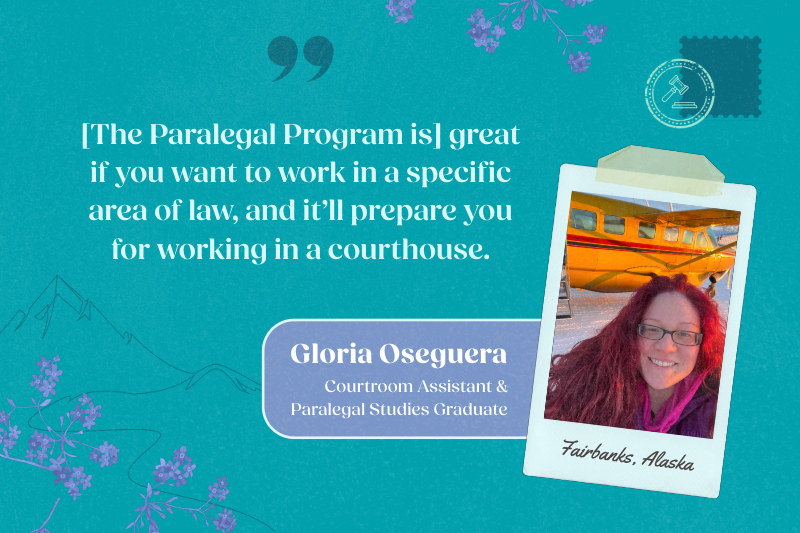From Paralegal Student to Courtroom Assistant: How One Woman’s Journey From CSUEB to the Remote Courtrooms of Alaska Redefined Her Career
BY ELIAS BARBOZA

In the minute city of Fairbanks, Alaska, with its population of 32,000 residents, the Northern Lights paint the skies during the winter months and temperatures reach an average 13 degrees Fahrenheit below zero. Inside the city’s courthouse, a woman dressed in business attire named Gloria Oseguera can frequently be found preparing a courtroom for a new trial. Typically, Oseguera is the main person responsible for everything running smoothly before the judge walks in. It’s also her duty to record each trial and summarize them for the judge.
But Oseguera’s courtroom journey didn’t begin in a small Alaskan city. It began in the Bay Area, specifically in Cal State East Bay’s Paralegal Studies Certificate Program.
“When I came into the court system I didn’t have any idea how particular law jobs work,” said Oseguera. “The Paralegal Studies Program helped me understand what’s being talked about in a courtroom, and have a better understanding of what’s happening in hearings, and what the important points are to include in the work that I’d be producing.”
Raised in Palo Alto, Oseguera attended University of Alaska, Fairbanks after graduating high school, where she earned a Bachelor of Arts in Sociology and another in political science. She returned to California with her college degrees and became the office manager for a Bay Area attorney. During her role, Oseguera decided to join a paralegal studies program to further her career. She chose CSUEB’s fully-online program because it’s accredited. After earning her certificate, Oseguera moved back to Fairbanks to reunite with her college sweetheart.
A personal quality that inspired Oseguera to join the legal field was being diagnosed with autism and attention-deficit/hyperactivity disorder (ADHD). One of her main ADHD traits that she said is an asset in her role is “justice sensitivity”, described as an intense cognitive, emotional, and behavioral reaction to injustice and a strong feeling for a need to restore justice.
“My particular job lends to someone with ADHD because you do so much at the same time, like typing the proceedings, making sure people are telephonically connected, watching the courtroom and communicating with the judge,” said Oseguera, explaining how her ADHD pushes her to be a perfectionist at work. “It's the perfect job for me because I’m interested in everything about law.”

Stenographers are not commonly used in Alaska, so one of Oseguera’s main tasks is to record proceedings with audio equipment and summarize them into organized accounts for the judge, known as “log notes”. As a traveling courtroom judicial assistant, Oseguera spends most of her time in Fairbanks. She regularly travels to distant courthouses located in remote, rural towns throughout her state, such as Bethel and Galena, where she conducts her normal job duties. Most of the court sites she frequents are accessible by car, but other locations are accessible only by airplane, boat or snowmobile. Her work trips can take several days, sometimes up to a week, and Oseguera once had to hop on a small bush plane to reach a secluded town’s courthouse.
Speaking highly of her job, Oseguera said the Paralegal Studies Program played a major role in paving her exciting career today.
“The Paralegal Studies Program is a great introduction to what you can expect working in the legal field,” said Oseguera. “It gave me a good background with legal research and writing, criminal law, and all kinds of different courses, and I could pick specific things that are in the legal field that I liked. It’s great if you want to work in a specific area of law, and it’ll prepare you for working in a courthouse.”
In addition to the program’s course work, Oseguera praised the program’s flexibility, making it easily accessible while holding a part-time job. She also spoke highly of the instructors, emphasizing how they treated her in a hospitable manner.
“I remember how knowledgeable the professors were and how kind they were, and it really felt like they care about you understanding the work,” said Oseguera. “I always felt very comfortable approaching them if I ever had issues. It felt like a good way to learn in a way that wasn’t intimidating. Some of them even wrote my letters of recommendation.”
Oseguera said she, her fiancé and their six dogs will stay warm in Alaska for the time being, and eventually, she plans to pursue further law-related education. A main reason for her decision, she said, was her positive experience in CSUEB’s Paralegal Studies Program.
“The program is fantastic and gives you a really great base to understanding the paralegal field and law in general,” said Oseguera. “It’s a great jumping off place to decide if you want to go into law school. I can’t rave enough about it!”
Return to Cal State East Bay Blog »
Paralegal Studies
Build your credentials with a flexible, highly regarded program that empowers you with the educational foundation necessary for a successful career as a paralegal. Learn more here.
